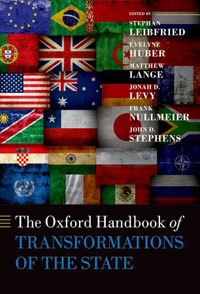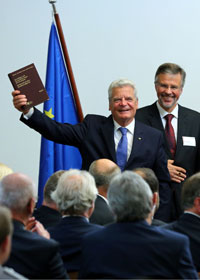Volume on welfare state research in Germany and its perspectives now published by Campus.The collaborative research project "Welfare State Policies in the 21st Century", elaborated by around fifty researchers from Germany, Switzerland, and Austria, scrutinizes the status and perspectives of welfare state research and was recently published by Campus. The project has been coordinated by the Centre for Social Policy Research (ZeS) and aimed at presenting interdisciplinary perspectives both in the long run and across boundaries. A previous extensive analysis of the current state of research revealed several gaps within the field.
In the OECD world, around a quarter of the entire GDP and almost half of public expenditures is spent on the welfare state, i.e. for the prevention of major risks in life. Although Germany represents one of the top-spending countries, respective research endeavours take a back seat. The performance of the welfare state is essential for an increasing number of people and its reforms characterize everyday life. Considering this as well as the manifold challenges - generated by transformations in education and working life, as well as family structures and significant demographic changes - the welfare state has to become a more central element in science and academic research. Otherwise blind flying social policy will become the norm while its success will be left to chance. The memorandum at hand examines upcoming challenges and suggests wide-ranging topical and analytical adjustments in social policy research.
Editor: Marius R. Busemeyer (Konstanz), Bernhard Ebbinghaus (Mannheim), Stephan Leibfried (Bremen), Nicole Mayer-Ahuja (Hamburg), Herbert Obinger (Bremen) and Birgit Pfau-Effinger (Hamburg).
Coordination: Kristin Bothur and Christian Peters.
Author: Klaus Armingeon (Bern), Peter Axer (Heidelberg), Friedrich Breyer (Konstanz), Ulrich Becker (München), Karl-Jürgen Bieback (Hamburg), Hans-Jürgen Burchardt (Kassel), Marius R. Busemeyer (Konstanz), Bernhard Ebbinghaus (Mannheim), Andreas Eckert (Berlin), Patrick Emmenegger (St. Gallen), Patricia Frericks (Hamburg), Karin Gottschall (Bremen), Olaf Groh-Samberg (Bremen), Andreas Hänlein (Kassel), Silja Häusermann (Zürich), Friedhelm Hase (Bremen), Richard Hauser (Frankfurt a.M.), Martin Heidenreich (Oldenburg), Johannes Huinink (Bremen), Gerhard Igl (Kiel), Ellen Immergut (Berlin), Bernhard Kittel (Wien), Tanja Klenk (Potsdam), Matthias Knuth (Duisburg), Stephan Leibfried (Bremen), Lutz Leisering (Bielefeld), Stephan Lessenich (Jena), Philip Manow (Bremen), Kerstin Martens (Bremen), Steffen Mau (Bremen), Nicole Mayer-Ahuja (Hamburg), Rita Nikolai (Berlin), Frank Nullmeier (Bremen), Herbert Obinger (Bremen), Birgit Pfau-Effinger (Hamburg), Stephan Rixen (Bayreuth), Heinz Rothgang (Bremen), Carina Schmitt (Bremen), Ronnie Schöb (Berlin), Margarete Schuler-Harms (Hamburg), Klaus Sieveking (Bremen), Peter Starke (Bremen), Christine Trampusch (Köln), Stefan Traub (Bremen), Gert G. Wagner (Berlin), J. Timo Weishaupt (Mannheim), Claus Wendt (Siegen), Martin Werding (Bochum) and Michael Windzio (Bremen).
Publication: Busemeyer, Marius; Ebbinghaus, Bernhard; Leibfried, Stephan; Mayer-Ahuja, Nicole; Obinger, Herbert; Pfau-Effinger, Birgit (Ed.), 2013: Wohlfahrtspolitik im 21. Jahrhundert. Neue Wege der Forschung, Frankfurt am Main: Campus
Contact:Prof. Dr. Stephan Leibfried (verstorben)
Prof. Dr. Herbert ObingerSOCIUM Research Center on Inequality and Social Policy
Mary-Somerville-Straße 5
28359 Bremen
Phone: +49 421 218-58567
E-Mail:
herbert.obinger@uni-bremen.de 
















